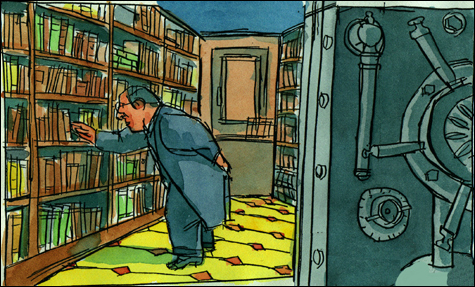
Ben Katchor |
| The Rosenbach Company | Jewish Theatre of New England, Leventhal-Sidman Jewish Community Center, 333 Nahanton St, Newton | November 17 at 8 pm; November 18 at 2 pm | $28; $26 seniors, students | 617.965.5226 |
If obsession is at the core of The Rosenbach Company, says co-creator Ben Katchor, that only makes the pop musical a human story. The musical relates the life of A.S.W. “Abe” Rosenbach, who was (with his brother Philip) possibly the most famous rare-book dealer in this country in the first half of the 20th century. “He was a man driven,” says Katchor, whose libretto and illustrations have been set to music by Mark Mulcahy. “He had a brother who drove him to make money, but it was all to serve his personal obsession with books.” The Rosenbach Company plays at the Jewish Theatre of New England this weekend, with Katchor directing and Mulcahy starring.For Katchor, who’s better known for such graphic novels as The Jew of New York and Julius Knipl, Real Estate Photographer, such a life as Abe’s has resonance. “I can identify with it,” says the New York–based artist whose work has been described (in the New York Times) as “Max Beckmann with dialogue balloons.” “I collect old photographs, but for a long time I collected matchbox labels, mainly Indian matchbox labels.” It’s an interest in manmade objects that also pervades his books. “They’re our history,” he continues. “The more you read about history, the more you understand why everything is the way it is.”

So when in 2004 Philadelphia’s Rosenbach Museum, which houses the brothers’ collection, contacted Katchor (who had by then won an Obie Award for The Carbon Copy Building) to commission a project commemorating its 50th anniversary, he was intrigued. “I think they thought I’d do an illustrated book of some kind. I’d already started doing these music-theater shows, so I said as a public event and a celebration I thought a theater piece would be a better idea. There’s a library filled with books, so another book . . . ” Besides, he says, theater can be seen as an extension of his graphic novels. (His pictures will be projected as part of the set.) “Comic strips are this combination of text and image, a graphic representation of an earlier form of theater. It’s all one big tradition, except the means of delivery have changed.”
Still, turning a life story into a performance piece had its challenges. “I mainly write fiction, so when somebody’s life has to be boiled down to a two-hour story, it’s a different kind of story.” The key was Rosenbach’s obsessive nature. “How does the obsessive need to own these things affect people’s lives? What lengths will they go to? That’s the thing we learn at the end, that this man went through this incredibly tortured life, struggling with his brother and drinking and his own obsession to have these books. And now he’s dead and it [his collection] is a library and anyone can go in and look at these books that he killed himself to put together.”
He concludes, “There should be a warning notice. Or maybe no warning is needed, because everybody understands.”
On the Web
Jewish Theatre of New England, Leventhal-Sidman Jewish Community Center: www.lsjcc.org